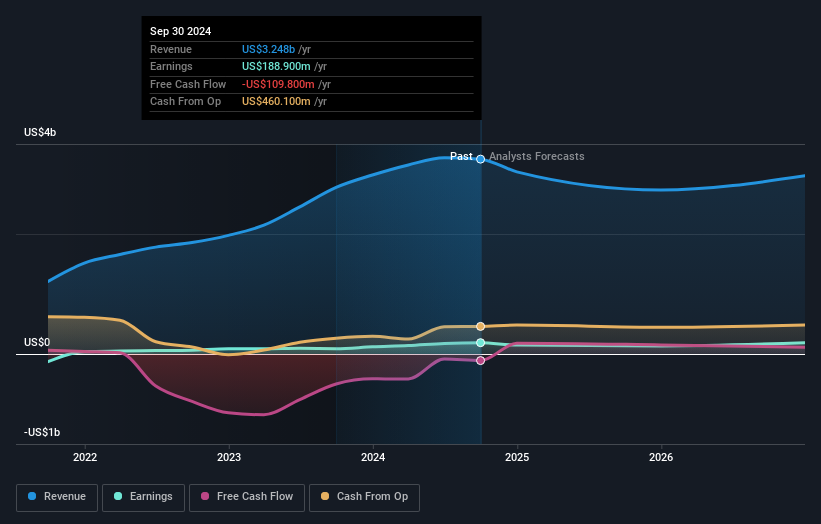- United States
- /
- Machinery
- /
- NYSE:TRN
Is It Too Late To Consider Buying Trinity Industries, Inc. (NYSE:TRN)?

Trinity Industries, Inc. (NYSE:TRN), is not the largest company out there, but it saw significant share price movement during recent months on the NYSE, rising to highs of US$38.37 and falling to the lows of US$32.52. Some share price movements can give investors a better opportunity to enter into the stock, and potentially buy at a lower price. A question to answer is whether Trinity Industries' current trading price of US$35.17 reflective of the actual value of the mid-cap? Or is it currently undervalued, providing us with the opportunity to buy? Let’s take a look at Trinity Industries’s outlook and value based on the most recent financial data to see if there are any catalysts for a price change.
See our latest analysis for Trinity Industries
What's The Opportunity In Trinity Industries?
Good news, investors! Trinity Industries is still a bargain right now according to our price multiple model, which compares the company's price-to-earnings ratio to the industry average. We’ve used the price-to-earnings ratio in this instance because there’s not enough visibility to forecast its cash flows. The stock’s ratio of 15.3x is currently well-below the industry average of 22.57x, meaning that it is trading at a cheaper price relative to its peers. Although, there may be another chance to buy again in the future. This is because Trinity Industries’s beta (a measure of share price volatility) is high, meaning its price movements will be exaggerated relative to the rest of the market. If the market is bearish, the company’s shares will likely fall by more than the rest of the market, providing a prime buying opportunity.
What does the future of Trinity Industries look like?

Investors looking for growth in their portfolio may want to consider the prospects of a company before buying its shares. Although value investors would argue that it’s the intrinsic value relative to the price that matter the most, a more compelling investment thesis would be high growth potential at a cheap price. Though in the case of Trinity Industries, it is expected to deliver a negative earnings growth of -7.9%, which doesn’t help build up its investment thesis. It appears that risk of future uncertainty is high, at least in the near term.
What This Means For You
Are you a shareholder? Although TRN is currently trading below the industry PE ratio, the adverse prospect of negative growth brings about some degree of risk. Consider whether you want to increase your portfolio exposure to TRN, or whether diversifying into another stock may be a better move for your total risk and return.
Are you a potential investor? If you’ve been keeping an eye on TRN for a while, but hesitant on making the leap, we recommend you dig deeper into the stock. Given its current price multiple, now is a great time to make a decision. But keep in mind the risks that come with negative growth prospects in the future.
So if you'd like to dive deeper into this stock, it's crucial to consider any risks it's facing. Our analysis shows 4 warning signs for Trinity Industries (1 is a bit unpleasant!) and we strongly recommend you look at these before investing.
If you are no longer interested in Trinity Industries, you can use our free platform to see our list of over 50 other stocks with a high growth potential.
Valuation is complex, but we're here to simplify it.
Discover if Trinity Industries might be undervalued or overvalued with our detailed analysis, featuring fair value estimates, potential risks, dividends, insider trades, and its financial condition.
Access Free AnalysisHave feedback on this article? Concerned about the content? Get in touch with us directly. Alternatively, email editorial-team (at) simplywallst.com.
This article by Simply Wall St is general in nature. We provide commentary based on historical data and analyst forecasts only using an unbiased methodology and our articles are not intended to be financial advice. It does not constitute a recommendation to buy or sell any stock, and does not take account of your objectives, or your financial situation. We aim to bring you long-term focused analysis driven by fundamental data. Note that our analysis may not factor in the latest price-sensitive company announcements or qualitative material. Simply Wall St has no position in any stocks mentioned.
About NYSE:TRN
Trinity Industries
Provides rail transportation products and services under the TrinityRail name in North America.
Proven track record average dividend payer.

